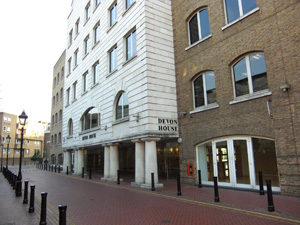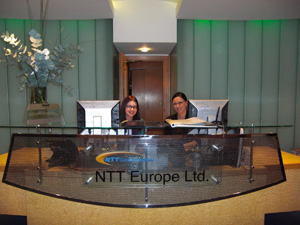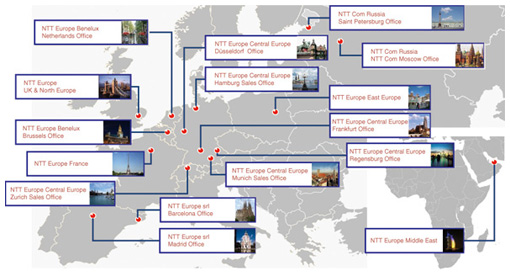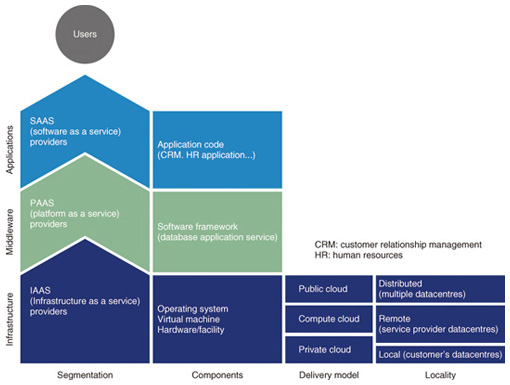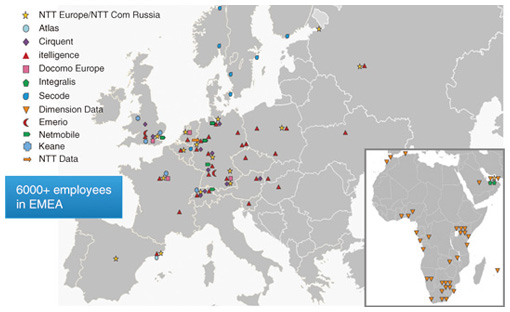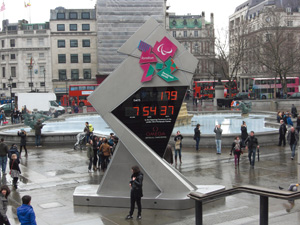 |
|||||||||
|
|
|||||||||
|
NTT around the World Vol. 10, No. 5, pp. 29–33, May 2012. https://doi.org/10.53829/ntr201205ov1  NTT Europe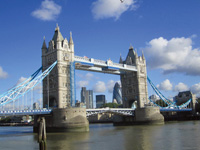 AbstractNTT Europe provides total global information and communications technology (ICT) solutions for enterprise customers in Europe, the Middle East, and Africa. This article describes NTT Europe's cloud services and its collaborative efforts with other companies in the NTT Group.
1. IntroductionFounded in 1988, NTT Europe [1] serves nine countries (the United Kingdom, France, Germany, Spain, the Netherlands, Belgium, Switzerland, Poland, and the United Arab Emirates) in the EMEA region (Europe, the Middle East, and Africa) from a total of 13 offices with its headquarters in London (Figs. 1”Ż3). It started expanding its business in the Russian sphere through collaboration with NTT Com Russia and is planning to expand its office presence to Italy and Sweden in 2012.
Since 2010, NTT Europe and NTT Europe Online (formerly Verio Europe) [2] have been integrating their business operations, bringing together the network business of the former with the managed-hosting business of the latter. Under the slogan of ONE! (One NTT in EMEA), they have been providing private networks, Global Tier 1 IP backbone access (IP: Internet protocol), and other network services as well as datacentre and cloud services, information and communications technology (ICT) consulting, and other enterprise solutions in an integrated manner. Furthermore, in 2012, NTT Europe moved to integrate business with Atlas Information Technology [3], a subsidiary of NTT Europe in Spain providing application-management services, as part of a plan to expand business as a core enterprise in the EMEA region. NTT Europe currently employs about 600 people of which only 20 or slightly more than 3% are employees dispatched from Japan. About 80% of all revenues come from European multinational customers, and the ratio of local staff is increasing yearly. NTT Europe's employees are of diverse nationalities: while some are citizens of the country where they work, others are from various EU, Asian, and African countries. The atmosphere within the company is very international. 2. Cloud services provided by NTT EuropeA key feature of NTT Europe is its provision of cloud services (Fig. 4), which has been the most advanced among NTT Group companies outside Japan. NTT Europe provides three types of cloud services as summarized below to serve a wide variety of customer needs: (1) Private cloud: A secure, high-quality, and easily managed environment enabling enterprise customers to roll out applications on a dedicated server infrastructure. (2) Compute cloud: A multi-tenant cloud fusing private and public clouds among which computing is allocated according to the customer's business, functions, and provided services. (3) Public cloud: A shared, multi-customer computing environment that can be easily and quickly provided (in collaboration with OpSource, Inc.).
NTT Europe excels not only in selling individual services but also in making proposals to its customers and providing them with attractive solutions that combine a variety of services. It is a top cloud services provider among overseas subsidiaries of the NTT Communications Group. Another feature of NTT Europe is its superb operations support system, which is essential to the operation and management of these cloud services. It lets customers themselves monitor and remotely control services running on servers at any location from a customer portal. They can easily and swiftly increase or decrease the number of virtual servers or server resources depending on current business conditions. This support system, developed by NTT Europe, is starting to be used for global cloud services in the NTT Communications Group. A third feature of NTT Europe is its ability to provide application-management services through its subsidiary Atlas Information Technology. Through these services, NTT Europe monitors and manages a wide range of software for databases, web servers, and other applications on behalf of the customer. This frees the customer from application upgrade management, application monitoring, fault handling, problem management, and other burdens that would normally be handled by an in-house team on a daily basis. 3. Collaboration with NTT Group companiesOne challenge facing NTT Europe going forward is how to foster collaboration with Dimension Data, Integralis, and NTT DATA Group companies, which are now expanding in Europe, so as to generate a synergetic effect. Although NTT Europe has only about 600 employees in Europe, the total if counted together with these NTT Group companies would represent a huge business group of about 150 offices and more than 6000 employees in Europe alone (Fig. 5). The objective here is to make full use of this large repository of resources.
On the business side, NTT Europe is already providing total solutions by combining its network and cloud services with the security services of Integralis, the information technology support services of Dimension Data, and the consulting services of the NTT DATA Group, and it expects to see a yearly increase in joint orders. In addition to collaborative connections formed by such joint business, ties are becoming even deeper as some of the new NTT Europe offices such as those in Brussels, Munich, and Milan come to be co-located with these group-company offices and conversely as group-company offices come to be co-located with NTT Europe offices such as those in Paris and Düsseldorf. 4. Future developmentsLooking to the future, NTT Europe expects to further expand its business coverage and service line-up and plans to raise its competitiveness in services by building up its network and datacentre/cloud services within the European region. Creating total NTT Group value and promoting that value in the market is without doubt the key to expanding NTT Group business in EMEA. References
NTT MSC — short column
British culture as seen through the Olympics
Amid the many sombre topics in Europe today, such as the Euro crisis originating in Greece and severe economic conditions and austerity policies in various countries, one of the few bright spots is the London Olympics to be held in August 2012. The Olympics have generated much conversation in the workplace. When tickets first went on sale, for example, there was lots of talk about which events people had been lucky to get tickets to and which were sold out. At the same time, it became apparent that similarities and differences between British and Japanese culture could be seen through the hosting of these Olympics. To give an example, public transport is predicted to be somewhat chaotic during the Olympics, and the advice given in a newspaper article entitled 'Survival Guide for Commuters' is to have a drink in a pub before going home to avoid the rush. This is about the same as having a drink in an izakaya before going home in Japan. On the other hand, there was a story of London Underground (subway) workers being offered a £500 bonus for their services during the Olym-pics to prevent a strike during that period and their union contesting that amount as being too low. Using the Olympics as a pawn in labour negotiations is a bit distasteful. At work as well, some cultural differences could be felt. We held monthly meetings on dealing with the Olympics beginning about a year before the start of the Games, and a business continuity plan for that period was discussed. Various questions were asked such as 'What should we do if a terrorist attack occurs?' and countermeasures were studied. Indeed, opinions were exchanged on a variety of threats that would hardly be thought of in Japan, such as 'What happens if employees cannot get to work if Underground workers strike?', 'What shall we do if employees request holidays en masse to attend Olympic events?', and 'How shall we respond to employees viewing a major event during working hours (given that the company's internal network could crash if many employees start watching a popular event by streaming video)?'. At first, I was somewhat confused, as I was not sure which of these were jokes and which were serious issues for discussion. Some surprising proposals”½at least to me”½were offered, such as 'Why not let employees watch a major event together in the company's conference room?' (But in all fairness, such a measure had already been taken during the 2010 World Cup soccer matches, when the England and Japan matches generated great excitement.) On speaking with people at local firms, I learned that this kind of activity was commonplace in England and that human-resource personnel would often provide food from various nations and treat the occasion as an employee event. I was impressed in the way that business continuity plans can differ from one country to another. This kind of minor cultural difference can make overseas service both fascinating and difficult at times.
|
|||||||||









